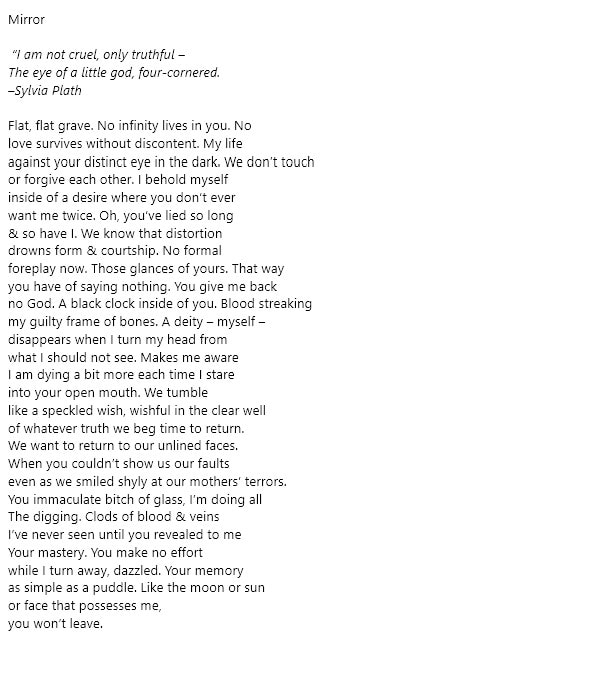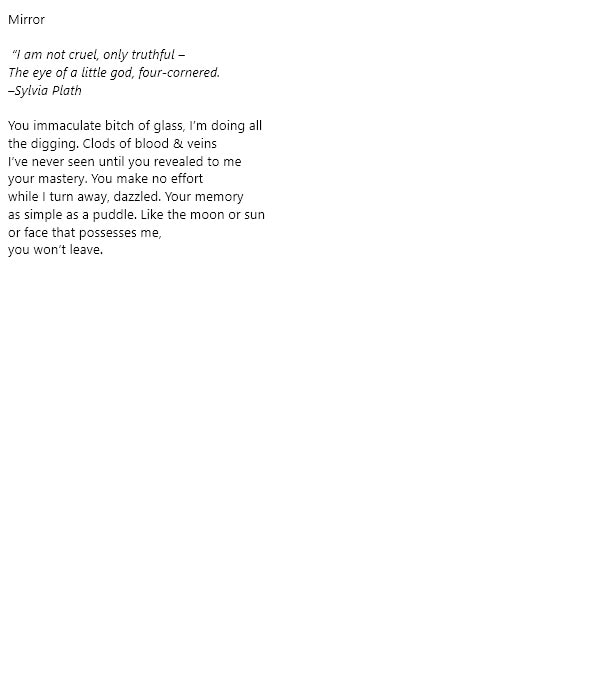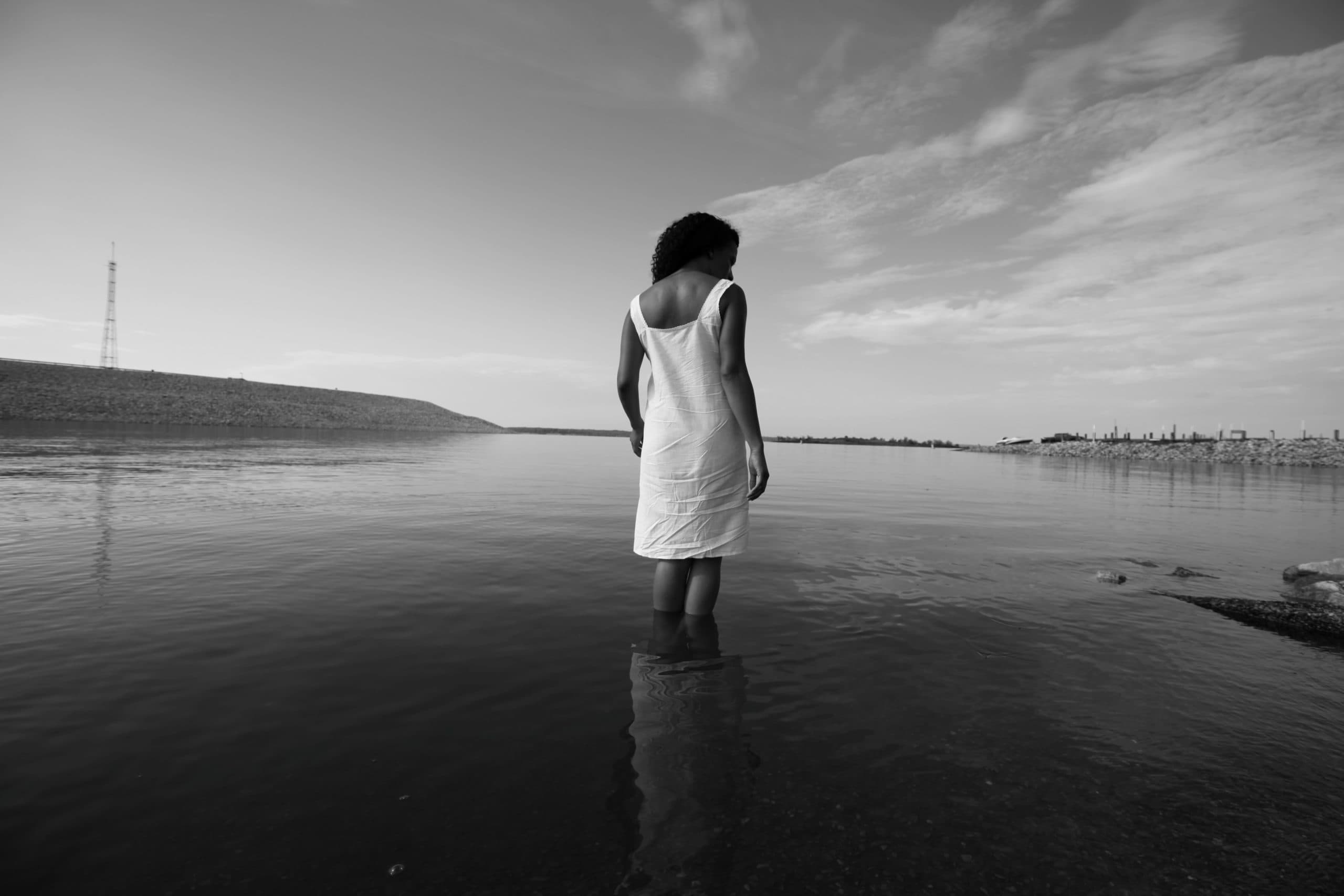

Mirrors are simple machines. Our relationship with them, however, is a thing of great complexity. They possess a haunting kind of mastery over us, turning us toward and sometimes against ourselves. They show us who we are, at least until we look away.
A celebrated poet and photographer, Rachel Eliza Griffiths has made a career of exploring how we might see our own image in a different light. In her latest collection, Seeing the Body, Griffiths brings together poetry and photography to powerful effect, providing the reader with an experience that’s both visually and emotionally arresting; the book tells the story of her mother’s death in 2014. When I asked Rachel Eliza why mirrors play such a critical role in this collection, she explained that they present a map not just of “our moods but our genealogy, our lineage.” Looking at herself in the mirror, she always recognizes her mother’s face.
— Ben Purkert for Guernica
Guernica: Is it common for you to revise like this? To cut everything but the end?
Rachel Eliza Griffiths: I’m a big fan of radical revisions. Maybe being a visual artist informs my process in that way. I often write first drafts on newsprint or a piece of vellum, simply because I don’t want to look at them as being precious. I don’t want to get lost in a courtship with the language.
Having said that, this poem’s revision is more radical than most for me. I cut twenty-one whole lines! But it had to happen. It was only towards the end of the poem where I felt like, “This is it. This is my rage. This is the real fire.”
Guernica: “You immaculate bitch of glass” certainly sets a fiery tone. I’m struck not only by the vulgarity but the fact that it’s gendered.
Griffiths: Well, there’s a particular way that other women will look at you that is almost more excruciating than a man looking at you, and I always think about that with mirrors. I associate them with a kind of conspiratorial energy. It’s like, “This mirror is a bitch too. If I’m a bitch, then so is this mirror because I’m in it.” It’s almost like a wink wink. Like, hey, we’re both bitches. Here I am, throwing my face against this thing and exerting a force on it even as it’s exerting a force on me. But I also rely on mirrors to make sense of my body. What I see is all I have really. My rage is connected to that frustration, feeling minimized in a way.
Guernica: That reminds me of this Alexandra Kleeman line: “The mirror has made us more careful about ourselves as objects, at the expense of caring for ourselves as whole beings.”
Griffiths: It’s totally true. You see people, in New York City or wherever, walking down the street and they’re looking into some store but what they’re really looking at is their reflection. They’re revising or erasing or recreating themselves in the presence of a mirror. It’s objectification, but it’s also more complex than that. When we look in the mirror, there’s always the possibility that we can be shattered. That we can give back the image we want or don’t want. That we can be reinvented.
And yet mirrors also connect us to our past in a way. They show us a map not only of our moods but our genealogy, our lineage. For example, now that my mother has passed, one of the very basic ways that I get to experience her in a physical form is by looking at my own image in a mirror. It’s just such a strange thing, this interaction or intersection or collision with who you are and aren’t.
Guernica: What do you mean?
Griffiths: This idea that, when I look into a mirror, I both see myself and see someone entirely different in the glass. And of course, the type of mirror matters. Is this distressed glass or smoked glass or clouded glass or frosted glass? I often prefer mirrors that are speckled and a little roughed up, the ones that aren’t so astonishingly and excruciatingly clean. I like when they have a little filth on them.
Guernica: What is it about the Plath poem that spoke to you?
Griffiths: I’ve carried her poem “Mirror” around with me for many years on and off. One of the lines from it is “Now I am a lake. A woman bends over me.” That image has always stuck with me. And funnily enough, in Seeing the Body, you’ll find a photograph where I’m standing in water with my back to the camera. It’s pretty much the same gesture.

Guernica: How did you decide to include your photography as part of Seeing the Body?
Griffiths: I never thought I would have photographs in it initially. It was very late in the process and I just kept thinking that my body is missing, and that felt like an omission. It seemed important to the narrative of my mother’s death.
Guernica: How so?
Griffiths: I was literally taking photographs when everything changed, and I jumped on a plane to fly to the hospital where she died. So it felt organic, actually, to include the photos. This is where I was in the world, at the time.
When I was a younger poet, I would always keep my visual work separate from my poetry. I would compartmentalize the two. Now, at this point in my life, seeing how life works, I’m not into binaries anymore. I can see that it’s all a mess. And one artistic process informs the other. I’m as much a lyrical photographer as I am a lyric poet.
Guernica: Is the process of editing a poem like editing a photograph?
Griffiths: They overlap in certain ways. One thing though is that, with poetry, I’m far more radical in revision, because it’s language and it’s my language. With photography, I always tell people, “I don’t do extreme airbrushing. I won’t retouch and take like ten years off you or something. If you want that kind of image, I’m not the photographer for you.” If I’m making self-portraits or something, then I do see it as material where I can experiment more. But I’m always cognizant of truth telling.
Guernica: Did you ever photograph your mother?
Griffiths: Once. She was running for a city council seat in the local town where she and my father lived, and she needed photos for her signs and billboards and things. She was a wonderful person who believed in community organizing, did a whole lot of work with the youth and sweeping up trash and taking care of neighborhood gardens and feeding seniors. Always very involved in being a citizen and what that means. She didn’t win in the end, but anyway, she needed the photographs. And this was a woman who truly detested having her photograph taken.
I was nervous to do it, because she was such a badass. If they had looked like shit, she would’ve told me that to my face. But fortunately they were lovely and she really liked them. The thing that hurts me most about those pictures was that later, after she died, these became the images used for her funeral and her obituary and everything else. I didn’t want those photographs to be a part of her afterlife. And yet, I think we both realized they would be, even while we were making them.
This is also how I feel about different poets I’ve photographed who have subsequently died. Now, when I see their portraits pop up somewhere, it’s a strange feeling. It’s a real collision of emotions about the art of a person’s image and their mortality.
Guernica: What’s it like to photograph poets? I imagine we’re not the easiest.
Griffiths: Ha. Well, when I’m photographing a poet, it’s not like it’s a photographer photographing a poet. It’s a poet seeing another poet. Whenever I photograph a poet, I always read their work, always. Because that’s the real clincher, that’s the interiority that I’m hoping I will access. I would never talk about photographing a poet in terms of taking their likeness or capturing their image or shooting them. I don’t want to use colonizing language like that. I prefer to call it a conversation or a collaboration where the poet isn’t just sitting there and I’m aiming my camera at his or her or their face, but that they are actively involved in presenting who they are. It brings me joy most of the time because the poet has a new book or a new project, and so I get to celebrate them in a very small way, which is meaningful.
Guernica: Lucille Clifton is one of my favorite poets. What was it like to photograph her?
Griffiths: Miss Lucille Clifton was at James Madison University for a weeklong celebration of her work, and one of the other poets there that week was Nikky Finney. And so, prior to that week, Nikky wrote to me and said “You have to photograph Lucille. I’ll arrange it. Will you come?” And I said of course. So I traveled down to Virginia and spent a week photographing Miss Lucille and Nikky Finney and an assortment of poets who had all come to just kind of sit at her feet and love her. We made a makeshift photo studio under some steps in the cafeteria or the student’s common building or something. And I pinned up a black background and I had my lights. And I was shaking. And she was so gracious and just gorgeous to me.
I like to play music whenever I photograph someone. I find that emotions come more easily to us in the presence of music. And so I asked Miss Lucille, “What should we listen to?” And she said Billie Holiday without missing a beat. Now please understand that I’m a huge Billie Holiday fan. I’ve been listening to Billie Holiday since I was seven or eight years old. Then, as we were about to start, a person came down and said, “Can some of us sit and watch you photograph her?” Usually I don’t allow that. It’s important for me to have the intimacy that comes with privacy. But this time I said yes. Because I realized, this isn’t just about me having Miss Lucille to myself. So suddenly all these people were sitting all along the wall in this tiny little space, and no one spoke. It was almost like being alone, except for Billie Holiday and Miss Lucille and Nikky Finney. It was an inspiring moment of community. Like we were all there together because we know what this woman has given us.
Then suddenly, Miss Lucille started singing along to all of these Billie Holiday songs. And someone said, “Who are you singing to like that, Lucille?” And she replied, “I don’t even see y’all. I’m singing to my husband.” It was just such a wonderful moment. I’m so grateful that all the life forces came together to allow me to have the gift of getting to photograph her and also learn from her as a poet and a black woman.
Guernica: That’s incredible.
Griffiths: I also remember, as she was looking into the camera, I saw such trust in her. She really trusted me in that moment. And this, I think, relates to mirrors too. It means a lot to have an image of yourself that you can believe in.
To read more interviews from our Back Draft archive, click here.